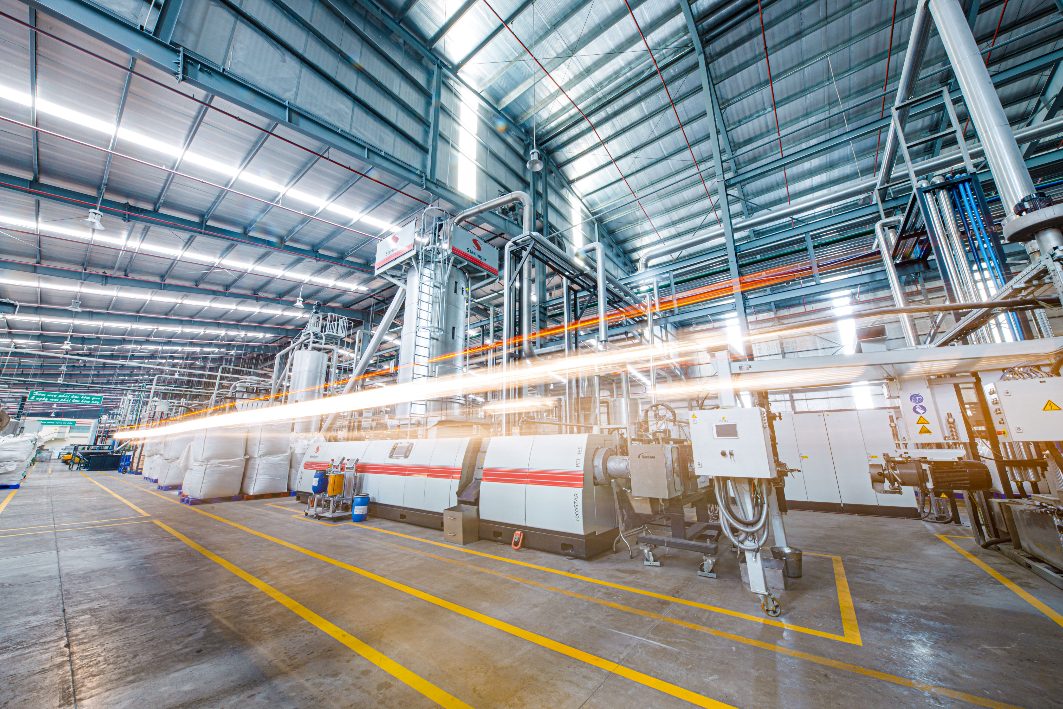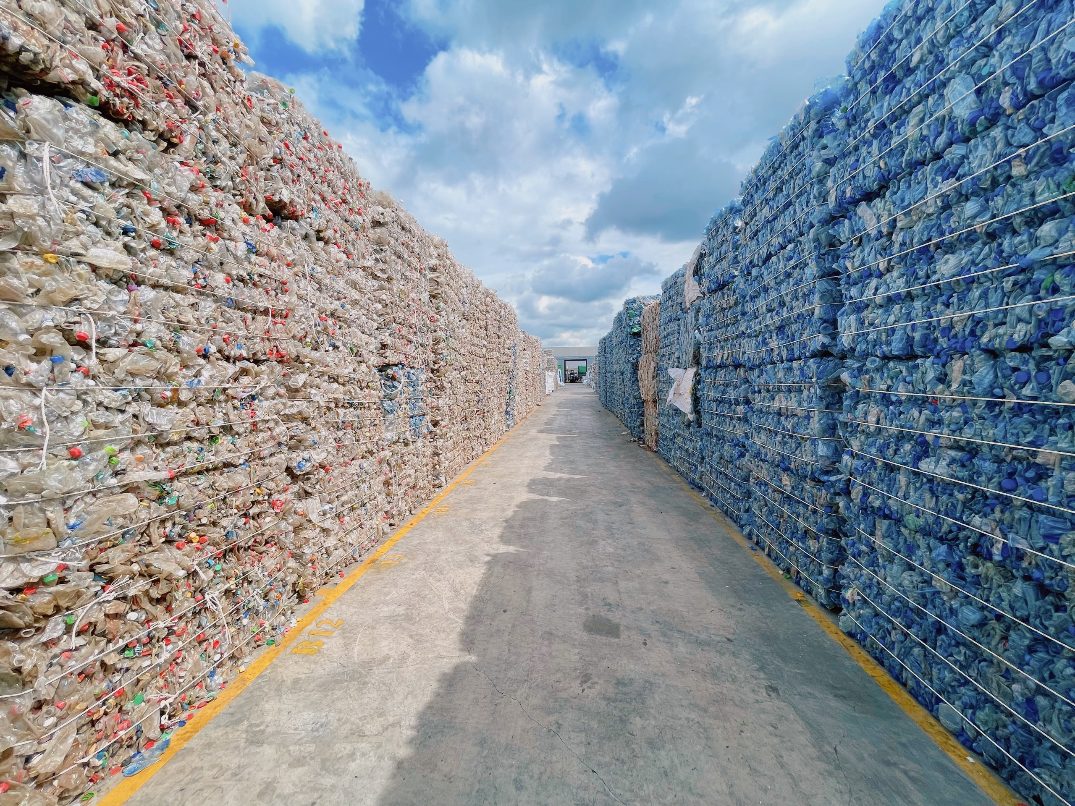Recycling used plastic bottles into plastic pellets that serve as raw materials across various industries is the main business line at DUYTAN Recycling, which is playing a crucial role in promoting a circular economy. Expanding this “recycling circle” is expected to yield a greater social impact in the future.
Connecting for recycling
DUYTAN Recycling has become a familiar name not only among manufacturers using recycled plastic pellets but also among consumers in recent years. Launched in 2021 with a plant in Duc Hoa District in Long An Province, DUYTAN Recycling has since increased its annual capacity by 1.5 times, reaching 60,000 tons of recycled plastic, with a target of 100,000 tons by 2026. The company is actively building connections to source used plastic bottles as materials and distribute plastic pellets.
For instance, DUYTAN Recycling recently signed a cooperation agreement with Ajinomoto Vietnam to collect and recycle plastic packaging under an Extended Producer Responsibility (EPR) program. In 2024, the two companies aim to collect and recycle 94 tons of plastic waste, or about 7.3 million plastic bottles.
In September, the city of Quy Nhon and the United Nations Development Programme (UNDP) launched a Waste Sorting at Source Program and inaugurated a Materials Recovery Facility (MRF) in the Long My Waste Treatment Zone. In collaboration with Plenma, DUYTAN Recycling is participating in this project, which is supported by the Norwegian Embassy and UNDP Vietnam, aiming to build a more efficient recycling network with an initial-phase target of processing four tons of plastic bottles per day.
In March of this year, DUYTAN Recycling joined forces with Coca-Cola for the “Recycling Bottles to Continuing the Journey” campaign. Through this initiative, all PET plastic packaging from Coca-Cola products in Vietnam is recycled by DUYTAN Recycling using “Bottle-to-Bottle” technology, reinforcing the message to consumers: “Keep Recycling Me.”
As a member of the Packaging Recycling Organization Vietnam (PRO Vietnam), which includes 30 leading companies from sectors such as consumer goods, packaging, retail, and import, DUYTAN Recycling collaborated with Unilever Vietnam at the end of 2023 to conduct training programs for scrap collection facilities across 13 provinces in the Mekong Delta. This initiative aligns with the aim of establishing a circular economy in Vietnam, particularly by collecting and recycling 30,000 tons of plastic waste from 2023 to 2027.
If DUYTAN Recycling is seen as the center of this “recycling circle,” its perimeter continues to expand, with the increasing volume of plastic bottles collected and recycled through collaborations with various organizations and individuals. This “recycling circle” is expanding not only in quantity but also in quality, as awareness of plastic bottle recycling gradually rises.
The goal of DUYTAN Recycling’s partnerships with other entities is not only to encourage plastic packaging collection and reduce environmental waste but also to build a circular economic model for waste management. Beyond production, the projects aim to raise environmental awareness and create a far-reaching impact within the community.
Joining forces to promote a circular economy
The “recycling circle” is expanding partly because 2024 marks a crucial year for recycling in Vietnam. According to the Environmental Protection Law 2020 and Government Decree 08/2022, starting January 1, 2024, producers and importers of batteries, motor oil, tires, and packaging (plastic, paper, etc.) must be responsible for recycling the products and packaging they manufacture or import once they’re discarded by consumers.
In February 2024, the Ministry of Natural Resources and Environment announced a list of 24 recycling entities, including nine companies recycling plastic packaging, three for motor oil, and four for electronic products. DUYTAN Recycling, in the plastic packaging category, processes PET, HDPE and PP packaging to produce recycled plastic pellets used in various industrial applications.

This makes recycling enterprises like DUYTAN Recycling pivotal, not only in supporting new regulations but also in encouraging businesses toward circular production chains where waste returns to its original raw material form. Thus, collaborating to implement EPR is a significant part of the effort to build and expand a circular economy in Vietnam.
In the future, EPR will not just be an environmental concern or an isolated business issue but an opportunity for all companies. By meeting growing partner requirements, businesses will have a greater chance of joining global supply chains. This presents an opportunity for recycling companies like DUYTAN Recycling, as most finished products are currently exported.
According to Le Anh, DUYTAN Recycling’s Director of Sustainable Development, EPR brings the benefit of attracting interest in recycled products from many partners. However, the company faces challenges in securing sufficient raw materials as unsorted waste can lead to contamination, reducing recycling efficiency. Currently, only about 60-75% of plastic can be recycled into high-quality products through “Bottle-to-Bottle” technology, with the rest used for secondary products. This issue is common among recycling enterprises.
This problem will be addressed as the “recycling circle” expands to include not only producers but also the public, from collection to waste sorting. The social impact will grow as DUYTAN Recycling and other recycling companies continue their journey of expanding these connections, moving toward a more complete circular economy.
In November 2024, DUYTAN Recycling was recognized as a Vietnam National Brand 2024. This long-term government program aims to build national brand images, increase competitiveness, and encourage businesses to share and pursue Vietnamese product values. For DUYTAN Recycling, it is a source of pride to contribute to solving Vietnam’s environmental challenges and an opportunity to expand its “recycling circle” in the future.









